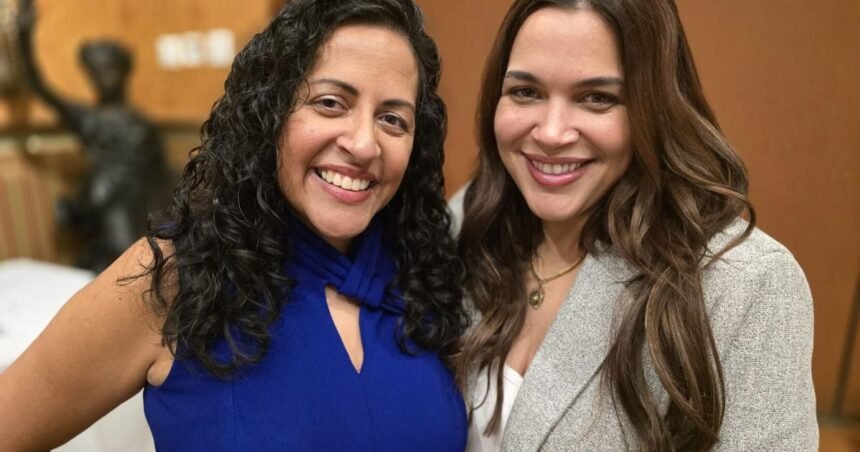TAMPA — Salomé Restrepo Álvarez arrived in the United States from Medellín, Colombia, at the age of 12, facing a drastic change in her environment. Adapting to a new reality was not easy, especially due to the language barrier and cultural differences. However, music became a refuge, a bond that allowed her to feel connected to her home.
“When I arrived, everything was unfamiliar. Hispanic music always made me feel at home. At every birthday, at every family gathering, the music from my homeland was always present,” said Restrepo.
Currently, Salomé lives in Tampa with her mother. Her life in the United States has been marked by adapting to new customs while maintaining a strong connection to her roots. Her integration into life in Tampa was shaped by the need to learn English, adjust to a new educational system, and find her place in a community with traditions different from those she knew.
“I already knew some English because I had studied it in Colombia, but speaking it every day and understanding it at school was another challenge,” Restrepo expressed. In this process, music played a key role, providing her with a connection to her origins and a way to make the changes more bearable.
Her school life takes place at Jefferson High School, where she is enrolled in the Law & Criminal Justice Academy, under the Magnet program. “I don’t consider myself a writer, but when my teacher told us about the essay contest, I was interested because the topic of music in Hispanic culture is something I have experienced since childhood,” she noted. Her family memories in Colombia are filled with moments where music was the protagonist, from festive gatherings to school activities where she performed songs that reflected her country’s history.
“We have always been a very close-knit family, and in every celebration, music was present,” she added. Although she is a rock music enthusiast, her essay explored the evolution of Hispanic music genres and their impact on cultural identity, highlighting the fusion of indigenous, African, and European influences in the development of contemporary rhythms such as salsa, vallenato, and reggaeton. In her analysis, she emphasized how music has served as a channel of expression for the Hispanic community and contributed to the construction of collective identity over time.
Her effort paid off when her name was announced among the winners. She won third place in the High School category, an acknowledgment that took her by surprise.
“I just wanted to express what music means to me and to our culture. It was an honor to see that my work was appreciated,” she stated. In addition to the cash prize, she received a medal and the opportunity to share her experience with other Hispanic students, encouraging them to explore their cultural identity through writing. This recognition has reinforced her confidence and interest in participating in more activities related to Hispanic culture.
A space for analysis and reflection for young people
The contest, which has been held for more than three decades in the Tampa Bay area, allows students to develop their ideas on various aspects of Hispanic culture. Carolina Ruiz, a board member of Tampa Hispanic Heritage and event organizer, explained the reasons behind the selection of the theme.
“Music has a broad reach. It is present in everyone’s life, marking important moments and becoming a point of cultural connection,” said Ruiz.
The jury, composed of specialists in the field of education, evaluated the essays based on various writing and content criteria.
“The level of argumentation from the students was remarkable. Their texts demonstrated a deep understanding of the impact of music on Hispanic identity, and this contest has been held for more than 35 years here in Tampa Bay. We understand that it is a great opportunity for students in the community, whether they are Hispanic or not, to also discuss the effect of Latin Hispanic culture worldwide,” expressed Ruiz.
Over the years, this contest has served as a platform for young people to explore their cultural heritage through writing, fostering research and critical thinking regarding the elements that shape Hispanic identity. The competition not only promotes academic exploration but also allows students to share their perspectives and personal experiences regarding music.
“We were surprised by the depth of the analyses presented, as the participants managed to connect the history of music with their own experiences,” explained Ruiz.
The contest has grown significantly in recent years, becoming a reference within the local educational community. The event included categories for middle school and high school students, as well as a special category in Spanish. Each of these divisions awarded participants who stood out for their analytical skills and originality in writing.
In the middle school category, the winners were Katherine Lacombe (first place), Capri Evans (second place), and Neal Datta (third place), under the guidance of teachers María Carolina Páez and Marisol Hernández-Rivera. In the high school category, the top two awards went to Taylor Gillespie (first place) and Mackenzie Spencer (second place), who, along with Restrepo, were supported by teachers Jennifer Gould and Judith Stocker. Finally, in the special Spanish category, Emily Brenes and Luisa Ramírez took second and third place, respectively, also guided by Marisol Hernández-Rivera.
The awards included recognition certificates, medals, and cash prizes, along with tickets to local attractions such as the Florida Aquarium, encouraging students to continue exploring their cultural heritage.
Music in education
For Dr. Mónica Lee Miranda, who has Puerto Rican heritage and serves as Associate Vice President for Community Engagement and University Partnerships at the University of South Florida, music plays an essential role in the social cohesion.
“Music is a tool that allows us to convey emotions and ideas, as well as a vehicle for education,” she stated.
For Miranda, music, besides being an artistic expression, plays a crucial role in building cultural identity and belonging within the Hispanic community, allowing new generations to connect with their roots in meaningful ways.
Universities play a key role in preserving and spreading musical culture. At USF, various academic programs and student activities facilitate the knowledge and appreciation of musical diversity. The university houses a vibrant community of musicians and students who seek to preserve and promote Latin rhythms.
“From salsa to reggaeton, Latin music continues to evolve and remains an important cultural force in the country,” Miranda concluded.
She also emphasized the importance of musical expressions as a way for people to make their voices heard.
“Students have the opportunity to create spaces where music acts as a bridge between generations and members of the community,” said Miranda.
The presence of these initiatives in the academic field strengthens bonds and contributes to educating young people about the significance of the Hispanic musical legacy.
Beyond its cultural value, music has historically been used as a means of communication and social change across generations. In this sense, the essay contest not only promotes research on musical history but also encourages students to reflect on its relevance and identity today.
During her remarks at the award ceremony, Miranda played several pieces of music by Latin artists. She recalled how each piece evokes her origins.
“Hispanic music is joy; it brings back many memories of my parents’ home in New York when we gathered for Christmas or Thanksgiving. The music of our community is synonymous with family for me. We always had music playing at home, and when I was a child, I danced to it on my father’s feet as he danced with me,” said Miranda.
She mentioned that one of her favorite sounds in the world is that of El Coquí in Puerto Rico—a small Puerto Rican frog known for the distinctive sound it makes at night. Its name comes precisely from the “co-quí” sound produced by the males to attract females. It is a cultural and natural symbol of the island, and its song is highly cherished by Puerto Ricans, evoking a strong sense of identity and nostalgia for those living outside Puerto Rico.
“Music is also healing. The sound of El Coquí soothes me, calms me, and helps me sleep. That, for me, is music; it is part of my culture and my island of Puerto Rico,” said Miranda.
Importance for the Hispanic Community
Miranda, Ruiz, and Restrepo agree on the importance of continuing to celebrate events like Tampa Hispanic Heritage’s, which connect with Hispanic identity, foster the teaching of cultural traditions, and build bridges between all nationalities.
“You will always find someone to share experiences with, even if they are not from the same country as you,” said Restrepo.
As for the recognition she received in the contest, she expressed her gratitude to THH.
“Thank you for considering me, for reading my essay, and for seeing in it the same thing I saw when I wrote it,” she expressed.
Meanwhile, Ruiz announced that the theme for the 2025-2026 contest will be revealed this summer.
“Students can stay tuned to our website, where we will share the new theme and deadlines so they can start working on their essays. If you are Hispanic or interested in the topic, you can support by spreading the word,” said Ruiz.











